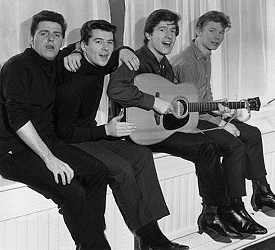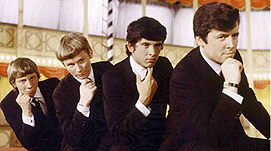Sixties
City presents
a wide-ranging series of
articles on all aspects of the Sixties, penned by the creator of the iconic
60s music paper Mersey
Beat
|
Sixties
City presents
a wide-ranging series of
articles on all aspects of the Sixties, penned by the creator of the iconic
60s music paper Mersey
Beat
|
||||||
|
 |
When Buddy Holly saw the western ‘The Searchers’, he penned ‘That’ll Be
The Day’, which is a phrase John Wayne used throughout the film. When the
group saw the John Ford western, they decided on adopting the name The Searchers
for themselves. Chris changed his name to Chris Curtis and Mike became Mike Pender. They were joined by vocalist Bill Beck, using the name Johnny Sandon, and became known as Johnny Sandon & the Searchers, building a reputation that placed them at No.5 in the first Mersey Beat poll. Johnny left the group to team up with the Remo Four and the outfit decided to remain a quartet. John McNally was to tell broadcaster Spencer Leigh: “One of my regrets is not having been managed by Brian Epstein. We’d have been a better band for it and he always wanted to sign us. He came to the Cavern to see us just before Johnny Sandon left and we knew that he was coming with a view to managing us. We took our gear down the steps and then went to the Grapes for a drink. That was fatal because Johnny got drunk, Tony got drunk and when we went on stage, it was chaos. Johnny pulled all the wires out. Everything went flat. We died a death and Epstein wasn’t interested.” Oddly enough, in the first issue of the magazine ‘Fabulous’, Brian Epstein said: “If I could retrace my footsteps and add just one more Liverpool group to my list of recording artists, I would choose to have the Searchers on my books.” The Searchers appeared at the Cavern on a number of bills with the Beatles, including Saturday 23rd December 1961 and on Wednesday 28th February and Wednesday 4th April 1962. The group played a season at the Star Club, Hamburg, where they first met Frank Allen, guitarist with Cliff Bennett & the Rebel Rousers. |
 |
 |
Back
in Liverpool the group was managed by Les Ackerley, a local accountant,
who also had ties with the Iron Door and the Odd Spot clubs. They signed with Pye Records and Tony Hatch became their recording manager. Their debut disc, ‘Sweets For My Sweet’, hit the top of the charts. They appeared with the Beatles on an all-Merseyside edition of ‘Thank Your Lucky Stars’, promoting the song. John Lennon was to say that he considered it to be the best record to come out of Liverpool. Brian Epstein gave them an original Lennon and McCartney number to record ‘Things We Said Today’. Management complications meant they couldn’t record it and the Beatles used it as the flipside of ‘A Hard Day’s Night’. The Searchers’ next hit, ‘Sugar and Spice’, was penned by their recording manager, under the name Fred Nightingale. The group’s third hit, ‘Needles And Pins’, introduced a jangly guitar sound which inspired the American band the Byrds. The Searchers had seven further British hits: ‘Don’t Throw Your Love Away’, ‘Someday We’re Gonna Love Again’, ‘When You Walk In The Room’, ‘What Have They Done to The Rain’, ‘Goodbye My Love’, ‘He’s Got No Love’ and ‘Take Me For What I’m Worth’. Their biggest hit in America was ‘Love Potion No. 9’, which was not issued as a single in Britain. With success came musical differences. Chris, who chose most of the group’s songs from his collection of American discs, felt that the group should direct themselves towards slower, melodic material, while Tony wanted more rip-roaring rock numbers. |
 |
Tony left and was replaced by Frank Allen. In the mid-1960s Chris left the
group and was replaced by John Blunt, whom Billy Adamson replaced in 1969.
Although their run of hits ended in the late 1960s, they received critical
acclaim for two albums on the Sire label, ‘The Searchers’ in 1979 and ‘Play
For Today’ in 1980. Mike left the band in 1985 to form ‘Mike Pender’s Searchers’
and vocalist Spencer James replaced him. A year after leaving the Searchers, Tony formed another group Tony Jackson and the Vibrations, although they had no major chart success and disbanded in 1967. Tony began to suffer from arthritis and a heart condition and was jailed for 18 months in 1996 for threatening a woman with an imitation pistol. He died of cirrhosis of the liver on 18th August 2003. Chris Curtis left the Searchers in 1966 and had a Top 40 hit with ‘Aggravation’, a single on which he was backed by Jimmy Page, John Paul Jones, Joe Moretti and Vick Flick. He was also instrumental in the formation of Deep Purple but left the music business in 1969 to work for the Inland Revenue and died on 18th February 2005. |
 |
|
Article
|